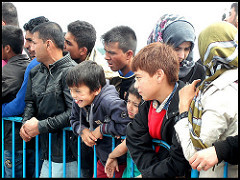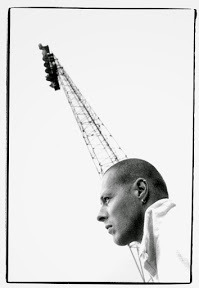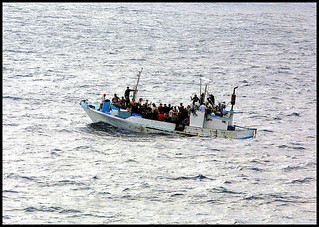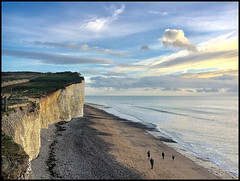Paul Alkazraji's Blog - Posts Tagged "united-kingdom"
Macedonian Migration
Went to the Idomeni refugee/migrant transit camp on the Greek border with FYR Macedonia yesterday, which receives thousands of people per day on route for Germany and northern Europe. We drove the 600km round trip to give them our gifts of 90 litres of water, plastic sheeting for 19 families, medicines and a big sack of shoes. Here’s a snap. We had a blessed day!

http://www.bbc.com/news/world-europe-...
‘Arrests have been made in the breaking of a people-smuggling gang by the French police in Calais, reports the Daily Mail. It’s believed to have smuggled 100 Albanian nationals into the UK, transporting them by boat to remote coves on England’s south coast between Weymouth and Plymouth…’ As such stories emerge, find out more about life in Albania through ‘The Silencer’; a novel set both there and in the UK.
https://www.goodreads.com/book/show/1...

http://www.bbc.com/news/world-europe-...
‘Arrests have been made in the breaking of a people-smuggling gang by the French police in Calais, reports the Daily Mail. It’s believed to have smuggled 100 Albanian nationals into the UK, transporting them by boat to remote coves on England’s south coast between Weymouth and Plymouth…’ As such stories emerge, find out more about life in Albania through ‘The Silencer’; a novel set both there and in the UK.
https://www.goodreads.com/book/show/1...
Published on October 01, 2015 05:45
•
Tags:
albania, calais, greece, macedonia, migration, people-smuggling, united-kingdom
'Heart of a Hooligan': Dave Jeal's story

Paul Alkazraji and Dave Jeal. Bristol, UK, Summer 2013.
Here is one of the original newspaper reports that led to the writing of the book.
From Hooligan to Holiness.
For Dave Jeal football violence had become a way of life. He talks to PAUL ALKAZRAJI about how becoming a Christian has given him a whole new set of goals.
Dave Jeal's appearance is a touch deceptive. He sports exactly the kind of haircut you would expect of someone who was, until recently, involved in the disturbing world of football violence. It comes as a revealing surprise, then, to find he had his head shorn only recently whilst working with Ark Christian Ministries amongst homeless people in South Africa.
Throughout the mid-Eighties and early Nineties Dave Jeal wore a neatly cut bob and was a 'casual', a 'boy', a member of a Bristol Rovers 'firm' know as the Young Executives. In layperson's English he was at the centre of gang fighting both at league matches and as an England Supporter during the 1990 World Cup.
"I first started going to football in 1972 when I was seven years old," he told me. "I left school at 15 and got in with a dodgy group of lads, and it just got out of hand really. It started off with us coining the away fans and things like that, then it got a bit more involved. We would get to the matches early to see where they parked their cars, and then leave early to go and wait for them. It was mindless violence."
"If Rovers were playing a Welsh club, we'd get to their town centres early, take as many liberties as we could, and try and find out where their firms' pubs were. The object was to take ground. There would be a lot of shouting, one or two punches might be thrown, and then one lot would run. It was a scary game. I've had bleach sprayed in my eyes and I lost my eye socket I've got a plastic one now. I've also got a false tooth and a broken nose. I wasn't very good at it."
Dave also travelled with rival Bristol City fans to England away matches. "During the 1990 World Cup Semi-Final we went in the German end of the stadium with the intention of unfurling our Union Jacks over the German flags, but we got marched out at gunpoint by the Italian police. On the way back to Naples they made us get off at a station where all the German fans were: 400 of them and about 30 of us. We ran into the Germans and this guy fired a flare pistol straight at me. It was bizarre. It can only have been God: it just went up and over my head."
Dave explained to me that the reality of evil impressed itself powerfully upon him during an incident in Stockholm, and it proved to be a turning point in his life. "In 1992 I went to Sweden for the European Championships. England got knocked out by Sweden and there was a full-scale riot outside the ground. I climbed a fence with another guy and got involved in a scuffle with some Swedish fans, and I started kicking one. I ran off up the road, and when I came back about 15 minutes later there were still six or seven lads kicking him on the ground. He was unconscious and he wasn't moving. It just sickened me.”
"I walked back to the stadium where we were sleeping, and I sensed this deeply evil presence all over Stockholm. It think it was because of the wickedness I had seen and had a hand in. My mum was a member of the Salvation Army and I phoned her up and asked her to pray for me. I was petrified."
Early the next day Dave began making his way towards the airport. "I was walking through a subway and there was no one else around," he told me. "Out of nowhere this Salvation Army guy came up the other way and stopped and looked at me. He smiled and nodded. He didn't say anything. It was bizarre. When I got back home I decided I would make a new start but I didn't."
Two and a half years ago, whilst volunteering at a project for Bristol's homeless run by his mother, Dave told me that he "took a shine" to a fellow helper, who invited him to her church. "I went to a service and I hated it. About 10 minutes before the end I just burst into tears. It freaked me, so I ran out to the pub and got pretty hammered. She invited me back, so I went to prove to myself it wouldn't happen again. It did, only this time I was locked in the middle of a row and 1 couldn't get out.”
"These two guys asked me if they could pray for me. I said, 'You can do what you want!' They said, 'Well, what do you want?' Then it hit me. I said 'I want all the anger and hate and pain inside me to go.' They said, 'Do you accept Jesus Christ' I said, 'All right,' and the next thing I knew I was laid out in the middle of all these chairs. I got up and I felt like this massive rucksack I had been carrying around my whole life had just been lifted off me."
Dave subsequently joined the congregation of Wood lands Road Church in Bristol. "It hasn't been easy for them or for me, because I like to call a spade a spade," he says. "I had this thing that I'm working class and I wouldn't be accepted, because most churches are middle class, but my church has been brilliant. They have given me so much support."
For the last two years Dave has helped run their youth group, and is in the process of starting up a half-way house for ex-prisoners and drug users emerging from rehabilitation, with the backing of his church. He has a warmth and gentleness which belies his history and are a testament to God's work.
I asked him how his mum had reacted to the news. "She had just got back from her holiday. I had been trying to phone her all afternoon, and I said, 'Mum I've got something to tell you.' It went really quiet. I said, 'I've become a Christian,' and she just screamed and she was crying."
Dave still attends Bristol Rovers matches, though no longer for the dark exhilaration of 'firm' membership. He still maintains old friendships, however, so I asked him how his new allegiance went down on the terraces. "They think it's hilarious," he told me with a grin.
"I went on Sunday with my girlfriend and some people from church. They were saying, 'Is this part of your new firm then?' I said 'Yes its God's firm!”
"The referee made a dodgy decision, and I was dying to shout abuse at him. They noticed and said, 'You wanted to swear then, didn't you' I said, 'Yes? They think that's brilliant, and that I'm still one of the lads. I am and I'm not, if you know what I mean."
Originally printed in the 12th June 1998 issue of the UK’s Catholic Herald.

Dave Jeal, 1998.
By Paul Alkazraji.

Published on February 25, 2021 08:46
•
Tags:
bristol-rovers, christianity, church, dave-jeal, england, european-championships, football, hooliganism, jesus, juventus-fc, millwall-fc, paul-gascoigne, soccer, stockholm, turin, united-kingdom, violence, world-cup
Albanians risk the choppy waters of the Channel

Image by Gerd Altmann from Pixabay.
Comment by Paul Alkazraji
As I viewed the modern glass towers and the bare-bricked communist era apartments of my Albanian town this summer, my son showed me a TikTok advert popping up on his phone. It was for dinghy crossings to England over the Channel for £5500. “You’ve already got your air ticket,” I joked, “and it cost a lot less.” Inside, though, I was surprised at the brazenness of it, and concerned that people smuggling adverts had reached him.
Since then, the figures of how many young Albanian men have been crossing the English Channel in small boats have become clearer: around 10,000 so far this year, with another 2000 Albanian women and children (up from 50 in 2020). As Albanian middlemen have got involved along the coast of northern France, they have been recruiting back home with some apparent success.
The majority of those Albanians risking the choppy waters will be economic migrants seeking a way to a better life. Some may have been trafficked for the sex industry. Some will game the system for asylum. Some will try to disappear and work illegally before returning home to Albania later with their earnings. Some may become debt bonded to the drugs gangs, if they let them pay the cross-Channel passage for them.

Albanians have been leaving their country for decades. There was a time under Enver Hoxha when rivers were electrified, those seen escaping were shot, and you could be sent to internment for saying the cheese was better in Greece. Later when communism crumbled, Albanians packed onto cargo ships from Durres, trekked through the mountain passes into Greece, and hid in secret compartments in the back of freight lorries to get out. These days they are not fleeing violent persecution, oppression or war, but rural poverty, unemployment, low wages, poor working conditions and corruption.
In the Albanian village where I work, I have heard many migration stories first hand. One time, a young man gave me his mobile phone the night before he left. I asked myself, why? Was it because he didn’t need it anymore, and intending to buy a new one in his destination country? Then I realised it was a kind of token for his safe keeping. “Don’t forget me. Keep an eye out for me…” he was saying. A young single mother once told me how she had waded a border river illegally at night to reach a job to bring money back home for her son. I was moved by her physical courage.
In this fallen world, there are so many people seeking a better life, a place of peace where they can build a livable existence and prosper. As the push factors mount up – wars, the increasing frequency and intensity of natural disasters, crop failures, food scarcity, cost of living crises - so will the number of people seeking to enter those places that presently have some stability.
Christians know how the story will end ultimately. There will come a time when ‘nations will not raise their swords against other nations, nor will they train for war any more’, and when ‘swords are made into ploughshares and each person can sit under his own fig tree in peace and enjoy the fruit of his vine’. Until then, the authorities will need the wisdom of Solomon to filter out and exclude those individuals who would bring additional destruction and pain to the community, and in compassion give refuge too to the traumatised and vulnerable.
The Albanian Prime Minister, Edi Rama, says the present climate is ‘fueling xenophobia by singling out one community’. It is true to say that Albanians in the UK are feeling the cold wind of hostility blowing in their direction at the moment. Three times it’s been said to me that 65% of UK inmates are Albanian when the figure is nearer 2%. Someone must be spreading that. There are more than half a dozen flights every day from Tirana to the UK bringing Albanians in and out legally as they work, study and visit their relatives. My son deleted the people smuggling adverts and we hopped on the plane with them too.
Paul Alkazraji is a British writer and the author of a novel called ‘The Migrant’, which is published by Instant Apostle.
Find it on Amazon: https://www.amazon.co.uk/gp/product/B...
Read Chapter 1: https://instantapostle.com/2019/02/22...

Published on November 17, 2022 09:29
•
Tags:
albania, albanians, english-channel, migration, united-kingdom



